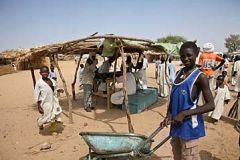Forcible recruitment of children reported in Darfur refugee camps
May 17, 2006 (N’DJAMENA) — Children as young as 13 are being forced into combat by Sudanese rebels who take the youngsters from squalid refugee camps in neighboring Chad, CNN has learned.
 In some cases, Chadian guards look the other way as rebels make children join their ranks, local people say.
In some cases, Chadian guards look the other way as rebels make children join their ranks, local people say.
Abdul, 16, told CNN he had no choice: “When I saw them beating some of the people, I was afraid. That’s why I couldn’t refuse to go.
“I’m not a volunteer — I was forced,” the boy said, visibly scared. (Watch children tell how they were coerced into combat)
The camps are supposed to offer shelter from the conflict across the border in Sudan’s Darfur region, where 180,000 people have been killed and 2 million others forced from their homes in fighting between rebels and the Sudanese government-backed Arab militias known as janjaweed.
Fighting has continued despite a peace agreement earlier this month between Sudan and Darfur’s main rebel group.
Refugees and U.N. officials say they fear that the janjaweed militias will attack the camps in revenge for the rebel recruitment.
Claire Bourgeois, head of the U.N. High Commissioner for Refugees’ eastern Chad mission, said, “It is something really, really serious for us. … We are really afraid that today the camp might become a target.”
The Arab janjaweed, blamed for displacing huge numbers of mostly black African Sudanese, are striking deeper and deeper into Chad, leaving a bloody trail as residents defend themselves with only bows and arrows.
In two camps, Teguine and Bredjing, close to 50,000 refugees live in desperate conditions, hungry and afraid for their lives — on more than one front.
Two months ago, about 100 Sudanese rebels came into the camps, about 40 miles (64 kilometers) from the Chad-Sudan border, and seized about 4,000 young men, according to Jamal, the camp leader.
Some were in their early teens, said Jamal, who said the rebels beat him for refusing to cooperate.
He said he feared that helping the rebels would open the camp to an attack from the janjaweed.
Tribal leader Yaqoub Abu from the Goz Amir refugee camp said that in the last three weeks, Sudanese Liberation Army rebels have begun brazenly entering his camp in uniform, and he said the ramifications of that move terrify him.
“If anyone discovers we have a relationship with the Sudanese Liberation Army and the refugee camps, we must be attacked,” he said. “And nobody can protect us. For this reason, we explain them, ‘No, don’t try this operation again.’ ”
Bows and arrows
The Chadian government faces the task of protecting the refugees, but local security officials have trouble protecting their own people, let alone the Darfur refugees.
One security official explained that his men had few resources to combat the attacks — no cars or pickup trucks, just six motorcycles.
And they have no guns, he said — Chadian rebels stole all the government-issued guns during a coup attempt a month ago. Villagers have been left to protect themselves with bows and arrows.
A top local official, who by international law is responsible for the refugees’ security, told CNN his men saw nothing out of the ordinary during the time the refugees said 4,000 people were recruited.
Bourgeois said the government knew and allowed the recruitment to take place.
Minni Minnawi, the commander of the Sudanese Liberation Army — which recently signed the peace deal with the Sudanese government — denied that his men were using the camps for recruitment.
Instead, he blamed members of two smaller rebel groups that did not sign the agreement, including one splinter group of the Sudanese Liberation Army.
The United Nations is fighting the recruitment on two fronts — telling the refugees not to take part and notifying the Chadian government that it must keep rebels away from the refugees.
But those calls may be too late. Katouma Osman told CNN her son was recruited — with her blessing. And she’s encouraging other young men to go, too, she said.
“We lost everything in Darfur,” she said. “My parents, brothers and sisters. We have to defend Sudan.”
And Abdul, who first said he was forced to join the rebels, later said that he would go back to fight again if the rebels have food and guns.
(CNN)
